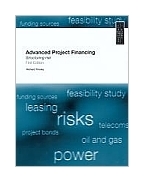|
||
• wydawnictwa polskie
• Zamów informacje o nowościach z wybranego tematu • kontakt
• Cookies na stronie |
ADVANCED PROJECT FINANCING STRUCTURING RISKTINSLEY R.wydawnictwo: EUROMONEY , rok wydania 2000, wydanie Icena netto: "...The wealth of
information will be appreciated by hardened industry professionals and by relative
newcomers. Tinsley is to be congratulated on this outstanding work..." Michael W. Good,
Managing Partner, Project Risk Advisors Ltd - London. Table of Contents Author biography xiv List of case studies xv List of exhibits xvii Introduction 1 Project finance's origins 1 Project finance defined 1 Project finance structuring 2 Advantages 6 Disadvantages 11 Summary 13 Chapter 1: Structuring stages 15 Technical feasibility stage 15 Financial feasibility stage 17 Market feasibility stage 20 Use in mergers and acquisitions 25 Project concept 25 Summary 25 Chapter 2: Funding sources 27 Local currency funding 27 Capital markets 30 Developers 34 Mezzanine 34 Merchant financing 34 Islamic lending 34 Governments-public-private partnerships 35 Leasing 35 Commodity-based lending 35 Equity 36 Summary 36 Advanced Project Financing: Structuring Risk Chapter 3: Cashflows 37 Modelling aspects 38 Cashflow controls 43 Modelling cashflows 47 Summary 50 Chapter 4: Financial advisers 51 Advantages and disadvantages 51 Need for an adviser 51 Advisory costs 52 Who are the financial advisers? 52 Summary 54 Chapter 5: Credit ratios 55 Debt service cover ratio 56 Residual 59 Interest cover ratio 62 Principal cover ratio 62 Present value ratios 62 Loan life ratio (LLR) 63 Project life ratio (PLR) 63 Residual life ratio (RLR) 63 Debt:Equity ratio (D:E) 63 Payback 63 Discount rate 64 Leveraged IRR 64 Choice of discount rate 65 Multi-tranche ratios 65 Accounting ratios 65 Summary 65 Chapter 6: Risk systems 67 Insurance 68 Statistical 70 Risk modellers 71 Checklist 71 Contractual/Jigsaw 72 Project finance 72 Chapter 7: Sector profiles 75 Sector features 75 Analysis by sector 78 Summary 87 Chapter 8: Structures 89 Risk 89 Risk division 92 Document matrix Interest 92 Principal 92 Drawdown styles 92 SPV 94 Mezzanine 95 Subordinated debt 96 Working capital 98 Bridge loans 98 Multi-tranche 98 Commodity funding 98 Contract structures 98 Trigger structures 105 Financed structures 109 Study structure 110 Avoided 112 Summary 116 Chapter 9: Due diligence 119 Systematic review 119 The feasibility process 120 Selection of experts/engineers 122 Customary reviews 123 Telecoms subscriber studies 129 Common sense 129 Chapter 10: Supply risk 131 Contract structures 131 Trigger structures 133 Financed structures 134 Study structures 134 Structures 138 Summary 139 Chapter 11: Market risk 141 Market-price 146 Contract structures 146 Trigger situations 148 Study techniques 150 Summary 151 Chapter 12: Foreign exchange risk 153 What percentage to structure? 153 Contract structures 153 Parallel loans 153 Barter 153 Trigger structures 154 Avoided 154 Study 155 Summary 155 Chapter 13: Operating risk - technical component 157 Contract structures 157 Trigger structures 160 Financed structure 160 Study structures 160 Summary 161 Chapter 14: Operating risk - cost component 163 Contract structures 163 Trigger structures 163 Financed structures 164 Study structure 164 Avoided 164 Summary 164 Chapter 15: Operating risk - management component 167 Contract structures 167 Trigger structures 168 Study 168 Summary 168 Chapter 16: Environmental risk 171 Contract structures 171 Trigger structures 171 Financed structures 172 Study 174 Avoided 174 Summary 175 Chapter 17: Infrastructure risk 177 Contract structures 177 Studies 178 Summary 179 Chapter 18: Force majeure risk 181 Acts of nature 181 Acts of man(kind) 181 Acts of government 182 Impersonal acts 182 Trigger structures 182 Studies 183 Summary 184 Chapter 19: Completion risk 185 Completion test 186 Contract structures 188 Trigger structures 192 Financed structures 194 Study approach 202 Sector completion protocols 203 Summary 205 Chapter 20: Engineering risk 207 Design/calculations 207 Study 208 Chapter 21: Political risk 211 Definitions 211 Government supports 218 Treaty protection 219 Contract structures 219 Trigger structures 225 Financed structures 226 Study sources 227 Avoided 227 Chapter 22: Participant risk 233 Sponsor pre-completion 233 SPV 235 Trigger structures 236 Study route 238 Avoided 238 Summary 238 Chapter 23: Interest rate risk 239 Contract structures 239 Trigger structures 240 Summary 241 Chapter 24: Syndication risk 243 Roles 243 Choice of banks and placements parties 244 Pricing 244 Disclosure 244 Contract structures 245 Study structures 246 Chapter 25: Legal risk 249 Legal regime 249 Concept of law 250 Enforcement 251 The courts 251 Solicitors/lawyers 252 Contracted structures 253 Trigger structures 253 Study structures 253 Avoided 254 Summary 256 Appendix 1: Differing definitions 257 M&A 257 Securitisation 257 Lawyers 257 Project financiers 257 Appendix 2: Typical owner controlled insurance programme (OCIP) 261 Section 1 Owner's project company insurance coverages - construction phase 261 Section 2 Contractor's insurance requirements - construction phase 264 Section 3 Owner's project company insurance coverages - operational phase 266 Glossary 269 289 pages Księgarnia nie działa. Nie odpowiadamy na pytania i nie realizujemy zamówien. Do odwolania !. |


